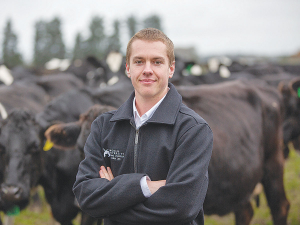Wired for Science: Understanding the feeding habits of mealybug
Fussy children might be frustrating, but fussy mealybugs could help protect the New Zealand wine industry from grapevine leafroll-associated virus 3.
 Cameron Marshall's research is showing promising results of using an animal-based solution to N leaching.
Cameron Marshall's research is showing promising results of using an animal-based solution to N leaching.
New Lincoln University pastoral livestock production lab research is defining how to get the maximum benefit from cows predisposed to urinate nitrogen (N), resulting in less leaching to waterways.
PhD student Cameron Marshall has just published two new articles in top scientific journals as part of his doctoral thesis, showing that what cows with phenotypically lower milk urea N eat, and how they eat, is important to their environmental impact.
He says inefficient N use from pastoral dairy production systems has resulted in concern regarding environmental degradation "and cows are demonised for it".
"This is a result of excessive urinary N leaching into waterways and nitrous oxide emissions from urination patches into the atmosphere. Dairy cows are demonised for it, but can be part of the solution too," he said.
His first paper reports that cows with low milk urea N concentrations eating plantain rather than a ryegrass diet, urinate significantly less N excretion per urination event, thus reducing the potential N leaching to waterways.
The second paper found that the grazing and ruminating behaviour of cows selected for divergent milk urea N, masticate, and ruminate the pasture they eat differently, which determines their rumen function and the efficiency of N digestion and use in the rumen.
This alters the N excretion patters to the environment. Cameron's previous research has already shown that cows selected for low milk urea N had a 28% reduction in the urinary urea N loading rate per urine patch than cows with higher milk urea N breeding values.
Those 'better cows' also yielding an increase in milk protein percentage.
"The results of this new research indicate two promising tools that temperate pastoral dairy production systems can use to reduce N losses and ameliorate the negative impact on the environment."
Cameron's research is showing promising results of using an animal-based solution in conjunction with dietary management strategies to reduce the environmental impact from dairy farms in New Zealand.
Chew On This
During this study cows divergent for milk urea N breeding values (MUNBV) exhibited different grazing patterns and oral processing of ingesta and digesta through differentiated mastication and chewing rates, respectively.
A greater number of mastications and chews in low MUNBV animals may result in a steadier inflow of more fermentable ingesta and digesta to the rumen, respectively.
This in turn may add to and help explain differential rumen function and nutrient supply to the host animal, which could help elucidate different observations in phenotypes previously reported for grazing dairy cows divergent for MUNBV.
Mating wrapped up last month at the across-breed Beef Progeny Test on Pāmu’s Kepler Farm in Manapouri.
Libby Judson is a keeper of memories from an age gone by. Tim Fulton tells her story.
A New Zealand-first native tree study has highlighted the Bioeconomy Science Institute's position as a forestry research leader.
Hemp fibre processor Rubisco is relocating its core processing facility to Ashburton as part of a $20-$30 million expansion to leverage what it says is an accelerating global demand for sustainable and renewable fibres.
Tradition meets some of the latest in technology at the 2026 East Coast Farming Expo.
Dairy prices have jumped in the overnight Global Dairy Trade (GDT) auction, breaking a five-month negative streak.
President Donald Trump’s decision to impose tariffs on imports into the US is doing good things for global trade, according…
Seen a giant cheese roll rolling along Southland’s roads?